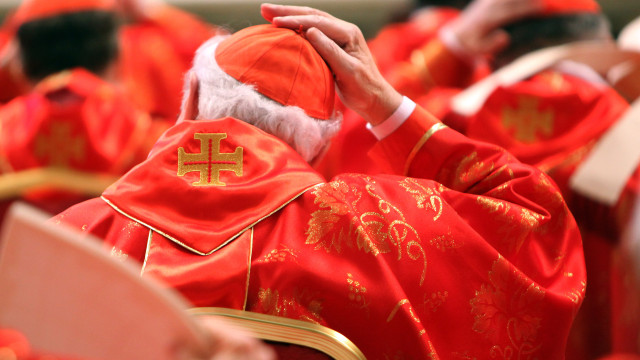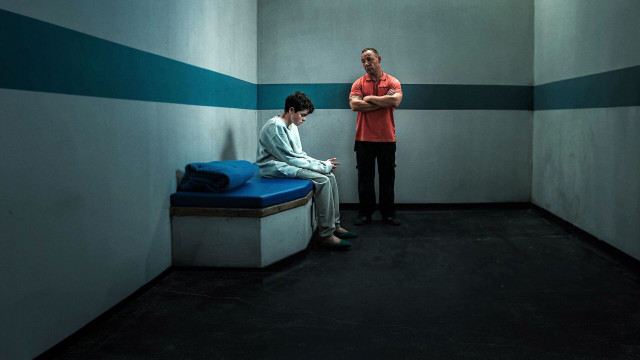





























© Getty Images
0 / 30 Fotos
Hassan Nasrallah
- Former leader of Lebanon’s Hezbollah party, Hassan Nasrallah, was assassinated by an Israeli airstrike in September 2024. A few months before his death, he gave an illuminating speech on the outskirts of Beirut. The speech was about his childhood.
© Getty Images
1 / 30 Fotos
Bourj Hammoud
- Nasrallah was born in 1960, a pivotal time in Lebanese history. As the eldest of nine children, his father was a vegetable and fruit seller in Beirut’s impoverished eastern neighborhood of Bourj Hammoud. This is one of many areas in Lebanon that would come to rely on the social support of Hezbollah.
© Getty Images
2 / 30 Fotos
Civil oriented
- The Hezbollah political movement, although often framed as merely a reactionary militant group, is profoundly civil-oriented. It is a movement that grew from marginalized groups to confront the aspects of society that harbor marginalization.
© Getty Images
3 / 30 Fotos
Lebanese Civil War
- Hezbollah is a Shiite Muslim political party and militant group based in Lebanon, founded during the Lebanese Civil War (1975–1990). Its development occurred along with the formation of the Israeli state and the influx of nearly one million Palestinian refugees into Lebanon.
© Getty Images
4 / 30 Fotos
Economically disadvantaged areas
- Their stronghold is primarily in areas that have been economically disadvantaged, including some suburbs in Beirut, such as where Nasrallah was born, as well as parts of southern Lebanon and the Bekaa Valley. These areas have been particularly devastated by Israeli airstrikes and ground invasions in 2024.
© Getty Images
5 / 30 Fotos
Social services
- In these regions, Hezbollah offers affordable and even free healthcare, as well as education services, for those who cannot access proper care or schooling otherwise.
© Getty Images
6 / 30 Fotos
Financial assistance
- Hezbollah provides financial assistance to impoverished families, including access to food, relief efforts, housing, investments in public services, cultural activities, and other assistance.
© Getty Images
7 / 30 Fotos
Quality of life
- These activities have been essential to the quality of life for marginalized communities, particularly those in poorer Shiite neighborhoods. An understanding of Hezbollah’s grassroots movement and support is essential to contextualizing its political influence.
© Getty Images
8 / 30 Fotos
Social welfare
- Policies promoting access to public services and social welfare, geared toward some of Lebanon’s poorest communities, are coupled with the political movement’s critique of marginalization exercised by political elites, which tends to favor wealthy Sunni and Christian communities.
© Getty Images
9 / 30 Fotos
Most marginalized
- Hezbollah has offered an alternative to the neglect faced by some of Lebanon’s most marginalized communities. This has not only made Hezbollah politically popular but, as outlined, they've become providers of public services where they otherwise do not exist.
© Getty Images
10 / 30 Fotos
Grassroots mobilization
- Hezbollah’s support has largely been generated through grassroots mobilization. This means that the groups of people who live in these impoverished communities are connected with a wide network of supporters that implements its programs and promotes political engagement.
© Getty Images
11 / 30 Fotos
Sense of support
- The structures that the group has put in place for these communities are essential to many people’s lives, offering a sense of support in a context that is otherwise unstable.
© Getty Images
12 / 30 Fotos
Understanding Hezbollah's stronghold
- Contextualizing Hezbollah as not only a political entity, but also a provider of social services helps to explain their stronghold in particular communities, and explains how they’ve managed to garner so much social power over the years.
© Getty Images
13 / 30 Fotos
Hezbollah among other parties
- How is Hezbollah’s presence and power interpreted by other sects and socio-economic classes? Among the Sunni population, there are conflicting views, particularly due to the group’s role in the Syrian revolution and its intimate relationship with other nations, such as Iran.
© Getty Images
14 / 30 Fotos
Other parties have benefitted from Hezbollah programs
- While the critiques from Sunni communities also depend on political ideologies, relationships with other parties, regions, and other contexts, particularly economically disadvantaged Sunni communities have also benefited from Hezbollah’s social programs.
© Getty Images
15 / 30 Fotos
No clear-cut relationship
- While there is no clear-cut relationship between Sunni communities and Hezbollah, there are a number of variables, such as socio-economic class, that strongly impact how the group is viewed by different communities.
© Getty Images
16 / 30 Fotos
Lebanon's Christian communities
- Similarly, Lebanon’s Christian communities also hold many different perspectives and relationships to the group. Some Christian groups are historically sympathetic to Israel. This was particularly evident during the Lebanese Civil War.
© Getty Images
17 / 30 Fotos
Sabra and Shatila
- The Lebanese Forces (LF) and the Phalange party are paramilitary groups formed during the Lebanese Civil War that had strategic alliances with Israel. In conjunction with Israeli forces, the LF and the Phalange had prominent roles in the 1982 Sabra and Shatila massacre, in which up to 3,500 Palestinian refugees were killed over the course of two days.
© Getty Images
18 / 30 Fotos
LF and Phalange
- The LF and the Phalange’s alliance with Israel and explicit opposition against Palestinian factions, as well as Syrian forces, made them a natural opposing force to groups like Hezbollah.
© Getty Images
19 / 30 Fotos
1990 Taif Agreement
- While the groups disarmed following the 1990 Taif Agreement, they merged and transformed into political parties. Christian communities have been at odds with each other depending on their political ideologies.
© Getty Images
20 / 30 Fotos
Free Patriotic Movement (FPM)
- Christian groups like the Free Patriotic Movement (FPM) have been at odds with Israel-aligned political groups, while being in political agreement with Hezbollah and sharing similar political interests.
© Getty Images
21 / 30 Fotos
Contrasting visions
- While opposition groups don't generally have military confrontations in contemporary Lebanon, the ideological oppositions between the groups speak to contrasting visions of the future of the country’s politics.
© Getty Images
22 / 30 Fotos
Druze and Armenians
- Smaller sects, such as the Druze and Armenian communities, have engaged in pragmatic relationships with Hezbollah. At times, the communities and their respective political parties have been aligned with Hezbollah’s political interests.
© Getty Images
23 / 30 Fotos
Neutral stances
- Other times, more oppositional and neutral stances have been taken in efforts to prioritize a minimization of involvement in sectarian conflicts.
© Getty Images
24 / 30 Fotos
Overlaps
- Hezbollah’s social welfare programs and services have benefitted many different sects and communities, creating overlaps in political and military strategies.
© Getty Images
25 / 30 Fotos
Differences in ideology
- Yet, there are a great deal of complex tensions that arise from differences in ideological positioning, with some groups identifying Hezbollah as a source of the country’s instability.
© Getty Images
26 / 30 Fotos
Isolating the country
- Frustrations have built along sectarian lines regarding Hezbollah’s position in refusing to disarm. At times, the lack of political progress has also been attributed to Hezbollah’s role in isolating the country from international support, particularly from the West.
© Getty Images
27 / 30 Fotos
Relationship with Iran
- Hezbollah’s role in other nation’s conflicts and its connections to countries like Iran have also contributed to frustrations regarding the country’s economic crisis and political vulnerabilities to violence.
© Getty Images
28 / 30 Fotos
Role in country's instability
- Therefore, although Hezbollah has played and will likely continue to play a significant role in covering the social welfare gaps of the state, its role in the country’s instability is a source of frustration for many of the nation’s communities. Sources: (Council on Foreign Relations) (ABC News) (CBS News) (Columbia Journalism Review) (Business Standard) (NPR) (AP News) (IMEU) (The Wall Street Journal) (Foreign Affairs) (BBC) (AP News) (NPR)
© Getty Images
29 / 30 Fotos
© Getty Images
0 / 30 Fotos
Hassan Nasrallah
- Former leader of Lebanon’s Hezbollah party, Hassan Nasrallah, was assassinated by an Israeli airstrike in September 2024. A few months before his death, he gave an illuminating speech on the outskirts of Beirut. The speech was about his childhood.
© Getty Images
1 / 30 Fotos
Bourj Hammoud
- Nasrallah was born in 1960, a pivotal time in Lebanese history. As the eldest of nine children, his father was a vegetable and fruit seller in Beirut’s impoverished eastern neighborhood of Bourj Hammoud. This is one of many areas in Lebanon that would come to rely on the social support of Hezbollah.
© Getty Images
2 / 30 Fotos
Civil oriented
- The Hezbollah political movement, although often framed as merely a reactionary militant group, is profoundly civil-oriented. It is a movement that grew from marginalized groups to confront the aspects of society that harbor marginalization.
© Getty Images
3 / 30 Fotos
Lebanese Civil War
- Hezbollah is a Shiite Muslim political party and militant group based in Lebanon, founded during the Lebanese Civil War (1975–1990). Its development occurred along with the formation of the Israeli state and the influx of nearly one million Palestinian refugees into Lebanon.
© Getty Images
4 / 30 Fotos
Economically disadvantaged areas
- Their stronghold is primarily in areas that have been economically disadvantaged, including some suburbs in Beirut, such as where Nasrallah was born, as well as parts of southern Lebanon and the Bekaa Valley. These areas have been particularly devastated by Israeli airstrikes and ground invasions in 2024.
© Getty Images
5 / 30 Fotos
Social services
- In these regions, Hezbollah offers affordable and even free healthcare, as well as education services, for those who cannot access proper care or schooling otherwise.
© Getty Images
6 / 30 Fotos
Financial assistance
- Hezbollah provides financial assistance to impoverished families, including access to food, relief efforts, housing, investments in public services, cultural activities, and other assistance.
© Getty Images
7 / 30 Fotos
Quality of life
- These activities have been essential to the quality of life for marginalized communities, particularly those in poorer Shiite neighborhoods. An understanding of Hezbollah’s grassroots movement and support is essential to contextualizing its political influence.
© Getty Images
8 / 30 Fotos
Social welfare
- Policies promoting access to public services and social welfare, geared toward some of Lebanon’s poorest communities, are coupled with the political movement’s critique of marginalization exercised by political elites, which tends to favor wealthy Sunni and Christian communities.
© Getty Images
9 / 30 Fotos
Most marginalized
- Hezbollah has offered an alternative to the neglect faced by some of Lebanon’s most marginalized communities. This has not only made Hezbollah politically popular but, as outlined, they've become providers of public services where they otherwise do not exist.
© Getty Images
10 / 30 Fotos
Grassroots mobilization
- Hezbollah’s support has largely been generated through grassroots mobilization. This means that the groups of people who live in these impoverished communities are connected with a wide network of supporters that implements its programs and promotes political engagement.
© Getty Images
11 / 30 Fotos
Sense of support
- The structures that the group has put in place for these communities are essential to many people’s lives, offering a sense of support in a context that is otherwise unstable.
© Getty Images
12 / 30 Fotos
Understanding Hezbollah's stronghold
- Contextualizing Hezbollah as not only a political entity, but also a provider of social services helps to explain their stronghold in particular communities, and explains how they’ve managed to garner so much social power over the years.
© Getty Images
13 / 30 Fotos
Hezbollah among other parties
- How is Hezbollah’s presence and power interpreted by other sects and socio-economic classes? Among the Sunni population, there are conflicting views, particularly due to the group’s role in the Syrian revolution and its intimate relationship with other nations, such as Iran.
© Getty Images
14 / 30 Fotos
Other parties have benefitted from Hezbollah programs
- While the critiques from Sunni communities also depend on political ideologies, relationships with other parties, regions, and other contexts, particularly economically disadvantaged Sunni communities have also benefited from Hezbollah’s social programs.
© Getty Images
15 / 30 Fotos
No clear-cut relationship
- While there is no clear-cut relationship between Sunni communities and Hezbollah, there are a number of variables, such as socio-economic class, that strongly impact how the group is viewed by different communities.
© Getty Images
16 / 30 Fotos
Lebanon's Christian communities
- Similarly, Lebanon’s Christian communities also hold many different perspectives and relationships to the group. Some Christian groups are historically sympathetic to Israel. This was particularly evident during the Lebanese Civil War.
© Getty Images
17 / 30 Fotos
Sabra and Shatila
- The Lebanese Forces (LF) and the Phalange party are paramilitary groups formed during the Lebanese Civil War that had strategic alliances with Israel. In conjunction with Israeli forces, the LF and the Phalange had prominent roles in the 1982 Sabra and Shatila massacre, in which up to 3,500 Palestinian refugees were killed over the course of two days.
© Getty Images
18 / 30 Fotos
LF and Phalange
- The LF and the Phalange’s alliance with Israel and explicit opposition against Palestinian factions, as well as Syrian forces, made them a natural opposing force to groups like Hezbollah.
© Getty Images
19 / 30 Fotos
1990 Taif Agreement
- While the groups disarmed following the 1990 Taif Agreement, they merged and transformed into political parties. Christian communities have been at odds with each other depending on their political ideologies.
© Getty Images
20 / 30 Fotos
Free Patriotic Movement (FPM)
- Christian groups like the Free Patriotic Movement (FPM) have been at odds with Israel-aligned political groups, while being in political agreement with Hezbollah and sharing similar political interests.
© Getty Images
21 / 30 Fotos
Contrasting visions
- While opposition groups don't generally have military confrontations in contemporary Lebanon, the ideological oppositions between the groups speak to contrasting visions of the future of the country’s politics.
© Getty Images
22 / 30 Fotos
Druze and Armenians
- Smaller sects, such as the Druze and Armenian communities, have engaged in pragmatic relationships with Hezbollah. At times, the communities and their respective political parties have been aligned with Hezbollah’s political interests.
© Getty Images
23 / 30 Fotos
Neutral stances
- Other times, more oppositional and neutral stances have been taken in efforts to prioritize a minimization of involvement in sectarian conflicts.
© Getty Images
24 / 30 Fotos
Overlaps
- Hezbollah’s social welfare programs and services have benefitted many different sects and communities, creating overlaps in political and military strategies.
© Getty Images
25 / 30 Fotos
Differences in ideology
- Yet, there are a great deal of complex tensions that arise from differences in ideological positioning, with some groups identifying Hezbollah as a source of the country’s instability.
© Getty Images
26 / 30 Fotos
Isolating the country
- Frustrations have built along sectarian lines regarding Hezbollah’s position in refusing to disarm. At times, the lack of political progress has also been attributed to Hezbollah’s role in isolating the country from international support, particularly from the West.
© Getty Images
27 / 30 Fotos
Relationship with Iran
- Hezbollah’s role in other nation’s conflicts and its connections to countries like Iran have also contributed to frustrations regarding the country’s economic crisis and political vulnerabilities to violence.
© Getty Images
28 / 30 Fotos
Role in country's instability
- Therefore, although Hezbollah has played and will likely continue to play a significant role in covering the social welfare gaps of the state, its role in the country’s instability is a source of frustration for many of the nation’s communities. Sources: (Council on Foreign Relations) (ABC News) (CBS News) (Columbia Journalism Review) (Business Standard) (NPR) (AP News) (IMEU) (The Wall Street Journal) (Foreign Affairs) (BBC) (AP News) (NPR)
© Getty Images
29 / 30 Fotos
Hezbollah explained: a complex role in Middle Eastern politics
Contextualizing Hezbollah's political movement
© Getty Images
Although Hezbollah is often narrowly described in Western media, learning about its origins, function, and impact is essential to understanding the current escalations Lebanon is experiencing in its war with Israel. Hezbollah is one of Lebanon’s most powerful political entities for a reason. While historically grounded in the Lebanese Civil War, Hezbollah is more than just the militant group we hear about most often. The group is democratically elected and has consistently secured significant representation in the Lebanese parliament for several decades. It operates through coalitions and strategic partnerships with other parties from different sects and provides essential social services for marginalized populations.
Curious to know more? Click through the gallery to find out.
RECOMMENDED FOR YOU




































MOST READ
- Last Hour
- Last Day
- Last Week








